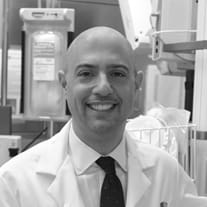What Can Science Tell Us About Death?
Sam Parnia, a leading expert in resuscitation science research, explains how death is not an absolute, but a process, and what happens when patients experience death.

By Robert Birchard
Across time and cultures, people have been conditioned to view death as an endpoint to the experience of life. However, advances in resuscitation science and critical care medicine have challenged assumptions about the finality of death. Sam Parnia, Director of the Critical Care & Resuscitation Research Division of Pulmonary, Critical Care & Sleep Medicine at New York University Langone Medical Center, recently spoke to The New York Academy of Sciences about his resuscitation science research. Dr. Parnia’s work illuminates how death is not an absolute, but a process, and what happens when patients experience death — sharing insights from his research in his own words:
What is death?
Death occurs when the heart stops beating. We call this death by cardiopulmonary criteria and it is how death is defined for more than 95 percent of people. A person stops breathing and their brain shuts down, causing all life processes to cease. More recently with the birth of modern intensive care medicine and the ability to artificially keep people’s hearts beating, doctors like myself can keep a patient’s heart beating longer.
Where people may have suffered irreversible brain damage and brain death, this leads to a situation where the brain has died, but the person’s heart is still beating, so legally, they are declared dead based upon irreversible brain death, or death by brain death criteria. This happens in a small fraction of the cases where people are declared dead.
For millennia death was considered an irreversible event and nothing could restore life. During the last decade, we’ve realized it’s only after a person has died that the cells inside their body, including the brain, begin their own death process. We used to think that you had five or 10 minutes before brain cells died, from a lack of oxygen, but we now know that’s wrong.
You have hours, if not days, before the brain and other organs in the body are irreversibly damaged after death. It’s actually the restoration of oxygen and blood flow back into organs after a person’s heart stops, but is then resuscitated that paradoxically leads to accelerated cell death. So, this accelerated secondary injury process is what we need to combat in medicine now.
Why is the term “near-death” experience inaccurate?
The problem with this term is that it is inconsistent with what people actually experience. It is undefined and imprecise. If I said ‘an airplane was involved in a near-miss incident,’ what does that mean? Did you have another plane come in within an inch of another plane, or were they a mile away? The term is ill-defined, and, it doesn’t take into consideration the fact that a lot of people have biologically died and returned.
What is a death experience?
I call it an “experience of death” because that’s what it is. People report a unique cognitive experience in relation to death. They may have a perception of seeing their body and the doctors and nurses trying to revive them, yet feel very peaceful while observing. Some report a realization that they may have actually died.
Later they develop a perception or a sensation of being pulled towards a type of destination. During the experience, they review their life from birth, until death, and interestingly this review is based upon their humanity.
They don’t review their lives based on what people strive for, like a career, promotions, or an amazing vacation. Their perspective is focused on their humanity. They notice incidents where they lacked dignity, acted inappropriately towards others, or conversely, acted with humanity and kindness.
They re-experience and relive these moments, but also, what’s fascinating, which sort of blows me away because I can’t really explain it, is they also describe these experiences from the other person’s perspective.
If they caused pain, they experience the same pain that other person felt, even if they didn’t realize it at the time. They actually judge themselves. They suddenly realize why their actions were good or bad, and many claim to see the downstream consequences of their actions.
How do studies of cardiac arrest inform the debate on the nature of consciousness?
Traditionally, researchers had proposed that mind or consciousness – our self – is produced from organized brain activity. However, nobody has ever been able to show how brain cells, which produce proteins, can generate something so different i.e. thoughts or consciousness. Interestingly, there has never been a plausible biological mechanism proposed to account for this.
Recently some researchers have started to raise the question that maybe your mind, your consciousness, your psyche, the thing that makes you, may not be produced by the brain. The brain might be acting more like an intermediary. It’s not a brand new idea. They have argued that we have no evidence to show how brain cells or connections of brain cells could produce your thoughts, mind or consciousness.
The fact that people seem to have full consciousness, with lucid well-structured thought processes and memory formation from a time when their brains are highly dysfunctional or even nonfunctional is perplexing and paradoxical.
I do agree that this raises the possibility that the entity we call the mind or consciousness may not be produced by the brain. It’s certainly possible that maybe there’s another layer of reality that we haven’t yet discovered that’s essentially beyond what we know of the brain, and which determines our reality.
So, I believe it is possible for consciousness to be an as of yet undiscovered scientific entity that may not necessarily be produced by synaptic activity in the brain.
